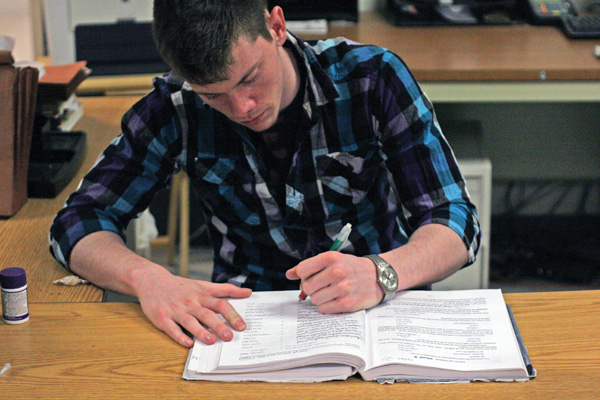
Binghamton University’s Arabic department, the only department in the SUNY system to offer a bachelor’s degree in the Arabic language, may be struggling to keep up with student demand due to limited budget resources.
Faculty and students in the department are complaining of crowded classrooms, insufficient instruction time and lack of funding for program expansion.
“In terms of trying to keep up with the demand, we are told declining budgets do not allow for this,” said Kevin Lacey, director of the undergraduate program in Arabic. “But pre-existing funding was taken away in 2008 right at the crest of a wave and that to me was rather inexplicable.”
Francis Naylor, a junior triple-majoring in Arabic, geography and philosophy, expressed concerns about the department at a town hall forum with University administrators on April 12.
Jean-Pierre Mileur, interim provost and vice president of academic affairs, said at the forum that a declining University budget was to blame for the current situation.
“When I was dean about 10 years ago, we expected a sharp upturn in Arabic after 9/11 and for long while that didn’t happen,” Mileur said. “Then it did, but we’re now dealing with a declining budget — so it’s part history and part timing. We’re making a hire this year and it’s likely the only one in language [departments]. We’re not ignoring you and we are hiring, but frankly the budget is just terrible.”
Lacey argued that periods of uneven growth in BU’s Arabic department in the last decade were due to an unsuccessful appointment in the department and did not reflect lack of student interest.
“As opposed to what was heard in the town hall meeting that the upturn didn’t occur until recently, we noticed a surge going back as early as 2001,” Lacey said. “Our majors have quadrupled over the past decade. This year we had over 125 students studying Arabic overall.”
In the fall 2010 semester, 35 students were enrolled in each of the two sections of Arabic 101 the department offered. Lacey said these numbers were too high.
“According to the American Congress for Teaching Foreign Languages, no more than 15 students should be in the classroom,” he said. “Anything above that is pretty much unacceptable because there is not enough time for interaction.”
However, many students were unable to enroll in the first place.
“[Last year] we were turning students away and we still had even more petitions coming in,” said Tayseer Gomaa, a lecturer in the Classical and Near Eastern Studies department.
Naylor said he thinks the University has put Arabic students at a disadvantage.
“I would like to see Arabic treated just like any of the other languages in the University,” Naylor said. “Other languages have many more professors per student.”
The program currently has two lecturing professors on staff. A third visiting professor will be added in the fall 2011 semester to assist with introductory courses.
“Language acquisition is similar to a sport, you need to practice constantly,” said Dylan Mahon, a sophomore majoring in computer science. “Classes now meet three times a week, which is nowhere near enough. Each student needs to have that personal interaction with the professor and you need that constant feedback.”


